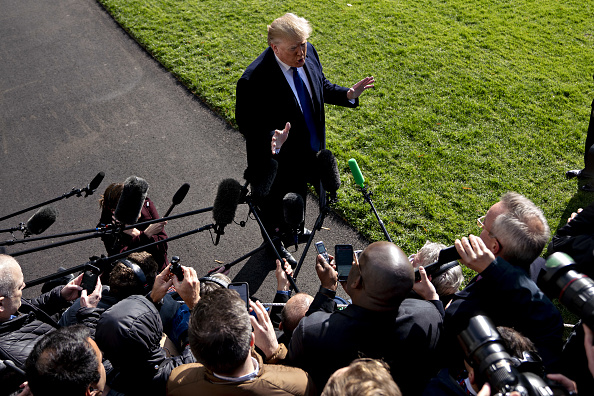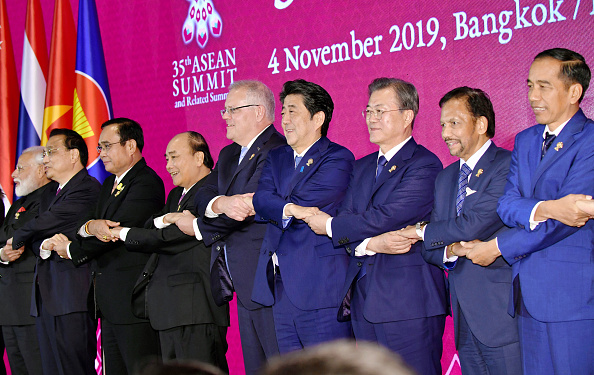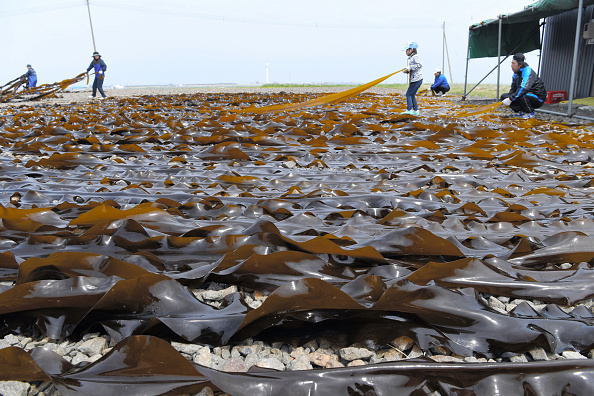
 "I haven't agreed to anything"
"I haven't agreed to anything"U.S. President Donald Trump pushed back against reports that the US and China were close to finalizing a Phase One trade deal today, after the Chinese Commerce Ministry announced yesterday that the two countries had agreed to roll back tariffs. A mutual lift in tariffs would end some of the tensions between the two countries and likely give a much needed boost to the global economy, which has been slowing for months. "We'll see what happens," the President Trump told reporters. "But we're getting along very well with China."
Stock markets, businesses, and farmers in the United States are eager for a truce to be reached to provide some economic relief. The deal could yet fall apart, as it has previously, but a trade deal would be a political win for President Trump as he enters into election season, as he could then claim that China ceded to his demands and bought more American goods.
Meanwhile, a U.S. shipment of soybeans has been sitting idle at a Chinese port, after customs demanded that the buying company pay 33% duties on the cargo. The order was made in the hope that tariffs would receive tariff exemptions, and is now being closely watched by other importers who wish to bring in more cargo.
As part of the trade negotiations, China has also demonstrated its commitment to clamping down on Fentanyl trafficking, a signature concern of the Trump administration. Nine traffickers have been sent to prison in China, after a trafficking ring was brought down by U.S. and Chinese law-enforcement agencies. Fentanyl overdoses have spiked in the United States in recent years, and President Trump has repeatedly linked trade negotiations to China's willingness to stem the drug trade.
 The World's Biggest Trade Pact
The World's Biggest Trade PactThe world's biggest trade pact was scuttled at the last minute this week after India pulled out of the Regional Comprehensive Economic Partnership (RCEP) at a summit in Bangkok, Thailand.
India claims that the proposed agreement, which would gradually remove all tariffs between 16 participating countries in the Asia-Pacific region, including China, would allow cheap Chinese goods to overtake India's struggling producers, harming Indian farmers and businesses. While not joining the deal could weaken India's already faltering economy, Prime Minister Modi was concerned over the "impact it would have on the lives and livelihoods of all Indians, especially vulnerable sections of society."
After India withdrew, however, the 15 other nations— China, Japan, South Korea, Australia, New Zealand, and the 10-member Association of Southeast Asian Nations (ASEAN)— nonetheless agreed to sign the deal next year, and committed to working together to resolve the market access issues.
 A Seaweed-based Breakthrough
A Seaweed-based BreakthroughIn a surprising announcement that shocked the global scientific and medical communities, Shanghai-based drugmaker Green Valley Pharmaceuticals has received conditional approval to begin selling a new seaweed-based drug to treat mild to moderate Alzheimer's, according to a press release from the Chinese pharmaceutical company. The approval was met by U.S. experts with caution as well as an eagerness to see the results, as it is the first drug in 17 years to receive approval to treat the cognitive disease.
The drug still needs additional review to be sold outside of clinical trials, and many experts noted that Chinese safety standards are not as stringent as U.S. approvals. China plans to start selling the drug in 2019, whereas U.S. and European trials won't begin until 2020.
While many in the US were caught off guard by the approval, some experts noted it should not be surprising that companies in China and elsewhere are making medical advances. "We are in a period of global innovation that we're not quite used to," said Dr. Jeffrey Cummings of the Cleveland Clinic, who has been an adviser to Green Valley for about two years. "This is a global disease and a challenge to the health and dignity of the elderly around the world."
Prepared by China-US Focus editorial teams in Hong Kong and New York, this weekly newsletter offers you snap shots of latest trends and developments emerging from China every week, while adding a dose of historical perspective.
- 2019-11-01 Don’t Hold Your Breath
- 2019-10-25 Weaponizing Diplomacy
- 2019-10-18 Economic Shudders
- 2019-10-11 A “Big Day of Negotiations”
- 2019-10-04 Birthday Celebrations
- 2019-09-28 A World Split in Two?
- 2019-09-20 Another Round
- 2019-09-13 Olive Branch or Olive Twig?
- 2019-09-07 The Unwinnable War?
- 2019-08-31 “Sorry, it’s the way I negotiate”
- 2019-08-23 Tit for Tat
- 2019-08-17 Slowdown Ahead?
- 2019-08-09 Yuan on the Rocks
- 2019-08-02 Ratcheting Up the Crisis
- 2019-07-26 Playing Defense
- 2019-07-19 “Stain of the Century”
- 2019-07-12 Whichever Way the Wind Blows
- 2019-07-04 A Gentlemen’s Agreement
- 2019-06-28 A Truce on the Horizon?
- 2019-06-22 Three’s A Crowd
